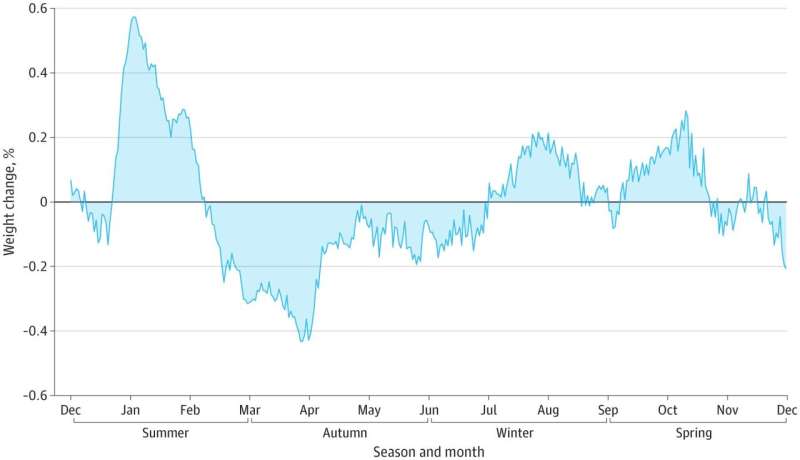This article has been reviewed according to Science X's editorial process and policies. Editors have highlighted the following attributes while ensuring the content's credibility:
fact-checked
peer-reviewed publication
trusted source
proofread
Preventing weight gain: Yo-yo no-go zones for Australians

There's no doubt that Aussies love a good celebration. We're all in when it comes to the weekend, and most of us can't go past a Christmas celebration without a little bit of overindulging. But all this comes at a cost, and it's taking a massive toll on our waistline.
Now, a world-first study from the University of South Australia exposes the real weight gains of everyday Australians, in a move to tackle overweight and obesity.
Published in JAMA Open Network, the study explored how weight changes across a 12-month period, finding that weight fluctuated throughout the year.
Specifically, the study found:
- Holiday weight gains—weight gain spiked during festive periods such as Easter (+0.29% or about 244g) and Christmas/New Year (+0.65%, or about 546g).
- Weekly weight gain cycles—we lose weight across weekdays, and gain it on weekends. Each week, weight fluctuates by 0.3% (about 252g).
- Seasonal weight gain cycles—people were significantly heavier in summer and lightest in autumn. Weight gradually increased during winter and early spring, then dipped at the end of spring (-0.27% compared to summer).
"Obesity is a major health concern across the globe, increasing the risk for many preventable chronic diseases and health conditions, including heart disease type 2 diabetes and even some forms of cancer."
Yet despite this, two in every three adults are overweight or obese.
"Understanding the factors that contribute to weight gain are a vital step in developing potential interventions."
"In this study, we found that Australians' weight cycles significantly fluctuate over a year, more so than our counterparts in the Northern Hemisphere," Prof Maher says.
"In Europe and North America, peoples' weight typically cycles up and down once a year—up in winter, down in summer—whereas our results revealed that Australians' weight cycle twice a year, like a yo-yo—up in summer, down in autumn, up in winter, down in spring."
"This sort of weight cycling—often seen with 'yo-yo' dieting—is not healthy and is associated poor metabolic health, and unfortunately, long-term weight gain."
Prof Maher says the study presents new opportunities for weight gain interventions.
"People tend to gradually gain weight slowly as we age, but knowing when these weight spikes are more likely to occur can provide us with valuable information to target temporal hot spots," Prof Maher says.
"Interventions and education campaigns focusing on risk periods (especially Christmas and winter) could help curb unhealthy weight fluctuations and prevent unwanted weight gain."
"Maintaining a healthy weight through healthy eating, exercise and other health habits is important for lifelong health and well-being."
"This research takes us one step closer to reducing the prevalence of overweight and obesity in Australia."
More information: Carol Maher et al, Weekly, Seasonal, and Festive Period Weight Gain Among Australian Adults, JAMA Network Open (2023). DOI: 10.1001/jamanetworkopen.2023.26038 jamanetwork.com/journals/jaman … /fullarticle/2807660





















